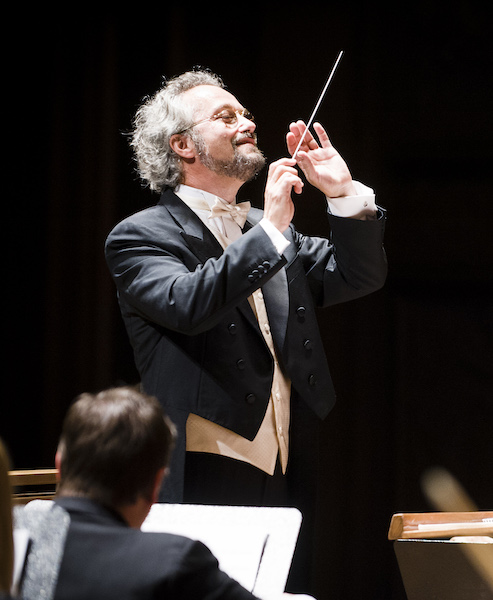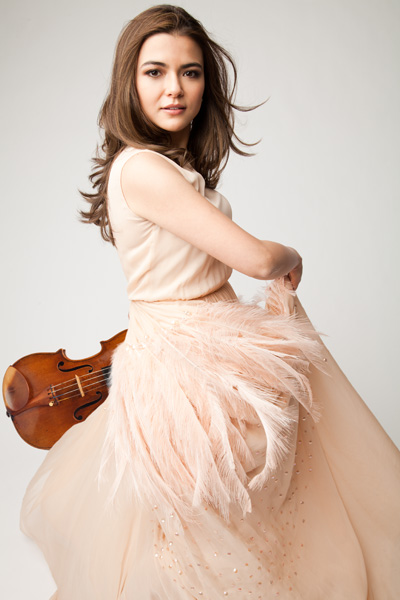Kalmar leads Dallas Symphony in dramatic Tchaikovsky, Beethoven

Carlos Kalmar conducted the Dallas Symphony Orchestra in music of Beethoven, Tchaikovsky and Walton Thursday night. Photo: Leah Nash
Conductor Carlos Kalmar—music director of the Oregon Symphony and the Grant Park Music Festival in Chicago— led an impressively dramatic exploration of works of Beethoven, Tchaikovsky, and Walton with the Dallas Symphony Orchestra Thursday night at Meyerson Symphony Center.
The chronological journey began with the opening fortissimo of Beethoven’s Coriolan Overture, which in turn led to a high-contrast reading, the strings arching into the lyrical second theme. As he would throughout the evening, Kalmar underlined Beethoven’s mood swings not only in volume level but in subtle tempo shifts to create a grand emotional effect.
Kalmar carried this intense approach over into Tchaikovsky’s Violin Concerto, in collaboration with violinist Karen Gomyo. In spite of its immense popularity, the Tchaikovsky warhorse presents a unique challenge in that the composer squeezed intensely rhapsodic thematic material into a strictly classical structure, which often gives the piece an uneasy, almost artificial feeling in performance.
Gomyo and Kalmar wisely emphasized the rhapsodic qualities, allowing each mood and section to stand out, ultimately creating the thrilling effect this work offers at its best.

Karen Gomyo
After the obvious and appropriately intense orchestral opening, violinist Gomyo entered with a perfect balance of assertiveness and elegance for the main theme, followed by a gentle—but still assertive—lyricism for the yearning second theme. Kalmar, for his part, produced a gorgeously broad aura of emotional abandon (but with absolute technical control) in the orchestral tutti, while Gomyo played with precise delicacy in the variation on the main theme in the development section. The recapitulation emerged serenely, and, Gomyo and Kalmar together placed the contrasting coda as a logical extension of the movement.
Gomyo pulled into a more subdued tone for the Andante middle movement, allowing the solo part to merge within the orchestra to create a sense of chamber music-style intimacy. A timpani-accented exclamation opens the final movement; here, Gomyo’s reading of the seductive second theme provided a highlight in a movement that eventually transforms into a virtuoso steeple-chase for soloist and orchestra.
The Uruguayan-born, Austrian-trained Kalmar has applied his international outlook as a prominent interpreter of 20th-century British and American music, and he closed the concert with William Walton’s Symphony No. 1. However modern it may have been considered at the time of its 1934 premiere, this work is very much a part of the romantic symphonic tradition of Brahms, Dvořák, and, by extension, Walton’s contemporaries Sibelius, Vaughan Williams, and Howard Hanson.
The entire forty-five minute length of Walton’s first symphony is packed with colorful orchestral effects, all of which Kalmar and a well-focused Dallas Symphony achieved. The first movement aims toward a momentous coda, built over an ostinato in the low brass and here was expertly delivered. The orchestra was likewise in fine form for the explosive Scherzo, with a characteristic Walton final cadence, with a jarring silence interrupting the exclamatory chords.
An eerie lyricism pervades the slow movement, followed, in the final movement, by the ceremonial grandeur of the sort Walton created in his most famous work, Belshazzar’s Feast.
Yet the superb sense of timing that enlivened Kalmar’s performance of the Tchaikovsky was strangely absent here. For all the intriguing and ear-grabbing moments in the score, it came across, in this performance at least, as a brilliant but ultimately cold exercise in orchestral color. Kalmar’s reading communicated the composer’s craft and expertise, but failed to find the depth of emotion this large-scale symphonic score implies.
The program will be repeated 7:30 p.m. Friday and Saturday and 2:30 p.m. Sunday at Meyerson Symphony Center. mydso.com; 214-692-0203.